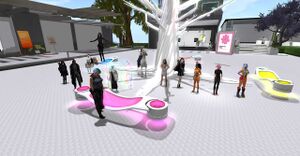Course:FNIS454/Making Kin with Machines
| FNIS 454 Indigenous New Media | |
|---|---|

| |
| About this Resource | |
| This open access resource is developed by the students of FNIS 454: Indigenous New Media. Via summary and analysis of key article, this wiki explores the theoretical, cultural, socio-political, and gendered dynamics underwriting the histories and futures of Indigenous new media as it develops out of the late 90s and into the present moment. | |
| Index | |
| |
Making Kin With Machines (Shauna Kormandy)
Jason Lewis, Noelani Arista, Archer Pechawis, and Suzanne Kite ask, “How do we as Indigenous people reconcile the fully embodied experience of being on the land with the generally disembodied experience of virtual spaces?” and “How do we come to understand this new territory, knit it into our existing understanding of our lives lived in real space, and claim it as our own?” Thinking of being an Indigenous person and what it means to be and feel fully embodied out on the land, is a feeling like no other, a feeling of full safety, full comfort and full groundedness. How do we move this embodied feeling into a disembodied experience of virtual spaces. Is it possible?
Background
One of the core beliefs to Indigenous epistemologies underpins ways of knowing and speaking that acknowledge kinship networks that extend to animals, plants, wind, rocks, mountains and oceans, “Man is neither height nor centre of creation”[1] Leroy Little Bear’s manifesto echoes Indigenous people’s beliefs that, “ultimately everything interconnects.”[1] Lewis, Arista, Pechawis, and Kite state that “Indigenous epistemologies are much better at respectfully accommodating the non-human.”[1] They go on to state that a sense of community is preserved and is expressed through complex kin networks secured in “specific territories, genealogies, and protocols.”[1] Furthermore, this is done with a goal which strives to treat these “non-human kin respectfully and reciprocally, and not as mere tools, or worse, slaves to their creators.”[1]
On Indigenous Epistemologies
Even though “there is no single, monolithic, homogeneous Indigenous epistemology”, most Indigenous peoples share similarities and reiterate how Indigenous beliefs consider non-human relations.[1] Many Indigenous epistemologies tend to centre on relationality. Little bear states, “in the Indigenous world, everything is animate and has spirit… ‘all my relations’ refers to relationships with everything in creation… knowledge is the relationship one has to ‘all my relations.’” These ways of knowing are built on shared core values of mutual respect. This respect has two key components, 1) acceptance of self-discipline by humans and their communities to act responsibly toward other life forms and 2) seeks to establish communications and covenants with other forms of life on a mutually agreeable basis.[1] The components that the authors identify help to understand the need for a more diverse way of thinking regarding our relationship with artificial intelligence and helps formulate plans on how to develop that relationship.[1] Relationality is rooted in context and the major context is place: “There is a conscious acknowledgement that particular world views arise from particular territories, and the ways in which the push and pull of all the forces work in that territory determine what is most salient for existing in balance with it.”[1] This knowledge is expressed and communicated through allowing one to walk a good path through the territory. “Language, cosmology, mythology, and ceremony are simultaneously relational and territorial: they are the means by which knowledge of the territory is shared in order to guide others along a good path.”[1]
The authors of “Making Kin with Machines” call on Hawaiian, Cree, and Lakota ontologies to reconceptualize AI-human relations and ask how looking at these machines as kin can base the new relationship on love instead of fear.[1] They end by stating that we must try to build a framework for an ethical relationship with AI, as “we flourish only when all of our kin flourish” (p. 13).
